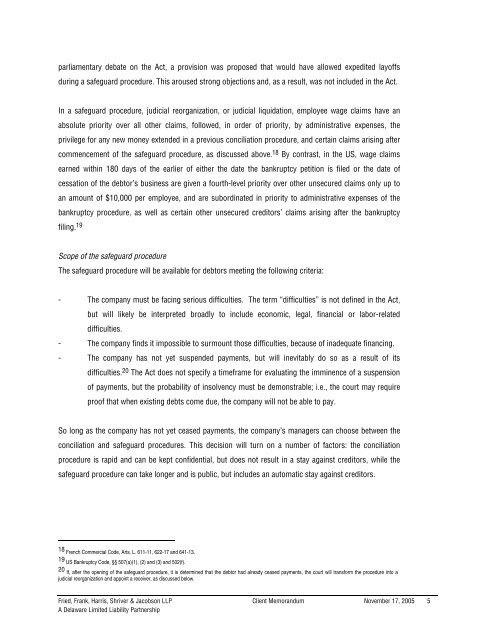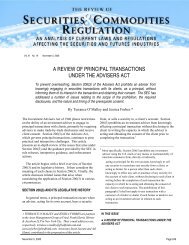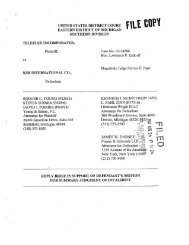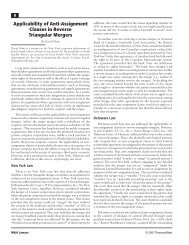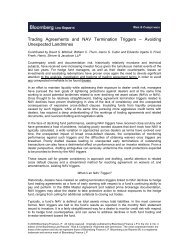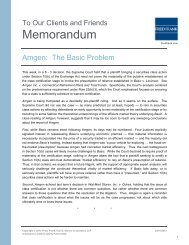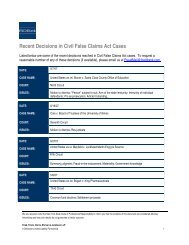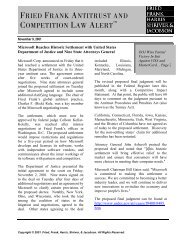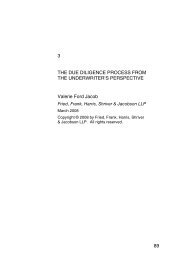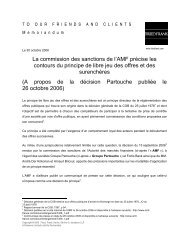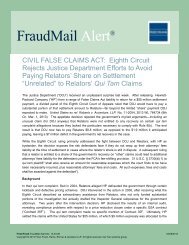Reform of French Bankruptcy Law - Fried Frank
Reform of French Bankruptcy Law - Fried Frank
Reform of French Bankruptcy Law - Fried Frank
You also want an ePaper? Increase the reach of your titles
YUMPU automatically turns print PDFs into web optimized ePapers that Google loves.
parliamentary debate on the Act, a provision was proposed that would have allowed expedited lay<strong>of</strong>fs<br />
during a safeguard procedure. This aroused strong objections and, as a result, was not included in the Act.<br />
In a safeguard procedure, judicial reorganization, or judicial liquidation, employee wage claims have an<br />
absolute priority over all other claims, followed, in order <strong>of</strong> priority, by administrative expenses, the<br />
privilege for any new money extended in a previous conciliation procedure, and certain claims arising after<br />
commencement <strong>of</strong> the safeguard procedure, as discussed above. 18 By contrast, in the US, wage claims<br />
earned within 180 days <strong>of</strong> the earlier <strong>of</strong> either the date the bankruptcy petition is filed or the date <strong>of</strong><br />
cessation <strong>of</strong> the debtor’s business are given a fourth-level priority over other unsecured claims only up to<br />
an amount <strong>of</strong> $10,000 per employee, and are subordinated in priority to administrative expenses <strong>of</strong> the<br />
bankruptcy procedure, as well as certain other unsecured creditors’ claims arising after the bankruptcy<br />
filing. 19<br />
Scope <strong>of</strong> the safeguard procedure<br />
The safeguard procedure will be available for debtors meeting the following criteria:<br />
- The company must be facing serious difficulties. The term “difficulties” is not defined in the Act,<br />
but will likely be interpreted broadly to include economic, legal, financial or labor-related<br />
difficulties.<br />
- The company finds it impossible to surmount those difficulties, because <strong>of</strong> inadequate financing.<br />
- The company has not yet suspended payments, but will inevitably do so as a result <strong>of</strong> its<br />
difficulties. 20 The Act does not specify a timeframe for evaluating the imminence <strong>of</strong> a suspension<br />
<strong>of</strong> payments, but the probability <strong>of</strong> insolvency must be demonstrable; i.e., the court may require<br />
pro<strong>of</strong> that when existing debts come due, the company will not be able to pay.<br />
So long as the company has not yet ceased payments, the company’s managers can choose between the<br />
conciliation and safeguard procedures. This decision will turn on a number <strong>of</strong> factors: the conciliation<br />
procedure is rapid and can be kept confidential, but does not result in a stay against creditors, while the<br />
safeguard procedure can take longer and is public, but includes an automatic stay against creditors.<br />
18 <strong>French</strong> Commercial Code, Arts. L. 611-11, 622-17 and 641-13.<br />
19 US <strong>Bankruptcy</strong> Code, §§ 507(a)(1), (2) and (3) and 502(f).<br />
20 If, after the opening <strong>of</strong> the safeguard procedure, it is determined that the debtor had already ceased payments, the court will transform the procedure into a<br />
judicial reorganization and appoint a receiver, as discussed below.<br />
<strong>Fried</strong>, <strong>Frank</strong>, Harris, Shriver & Jacobson LLP Client Memorandum November 17, 2005 5<br />
A Delaware Limited Liability Partnership


